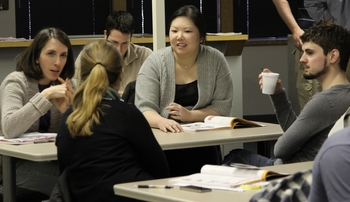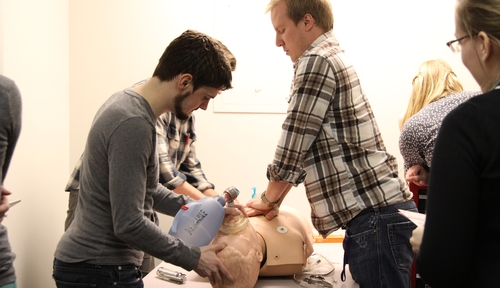Leadership:
Dennis McNeilly, Psy.D., assistant dean for continuing medical education (CME)
Lois Colburn, executive director
No. of People: 18
Website: www.unmc.edu/cce
Mission:
The mission of the UNMC Center for Continuing Education is to support the continuing professional development of health care professionals within Nebraska, the region and the nation.
History:
The Center for Continuing Education (CCE) has been continuously accredited since the mid-1960s and is among the oldest CME programs in the U.S. The center is currently accredited through July 2014 by the Accreditation Council for CME. In a typical year, the center certifies more than 300 activities and issues more than 20,000 certificates to health care professionals, including live courses, regularly scheduled series (e.g. grand rounds, case conferences), faculty development, outreach, online CME, enduring materials, and American Heart Association Basic Life Support/ Advanced Cardiovascular Life Support/Pediatric Advanced Life Support.
Services Offered:
Assistance with educational design, implementation and evaluation of continuing education activities, identifying sources of funding, registration (including receipt of fees and activity accounting), logistical support for live activities, and web marketing and hosting.
Areas of Focus:
Clinical Medicine:
The clinical medicine team collaborates with campus, local and national partners to provide a broad range of educational activities, with a strong emphasis on documented knowledge gaps, competency and performance improvement. Attendees include regional, national and international health care professionals.
Outreach:
In collaboration with College of Medicine faculty, the CCE provides live, telehealth and web CME offerings tailored to meet the needs of Nebraska’s rural health care providers. Activities are made available to all Nebraska critical access hospitals and archived on the web for 24/7 viewing. Upcoming activities include a series on diabetes and one on infectious disease.
Emergency Medical Services:
The Center is an American Heart Association training center and provides courses on and off campus throughout the state, and Western Iowa reaching more than 6,500 individuals annually. Off-site activities range from working with critical access hospitals, pre-hospital personnel, clinics, plus CPR/first aid for elementary and high school students, as well as major employers in Nebraska.

Faculty Development:
Offered at no charge to faculty in all UNMC colleges, faculty development programs are designed as a platform for inter-professional dialogue and collaboration on topics relevant to health professions education. Faculty development activities include an ongoing lunch lecture series, half-day, full-day and multi-day intensive programs as well as 12-18 month cohort based programs on leadership and educational scholarship.
Program Highlights:
PPLC – The Pan Pacific Lymphoma Conference, which originated in 1994 and has become a trusted source for educational excellence, brings together more than 500 members of the multidisciplinary lymphoma clinical team including oncologists, hematologists, pathologists, clinical scientists, and nurses who provide care for patients with non-Hodgkin’s lymphoma. A full complement of research and clinical case presentations, symposiums, posters, and exhibits make this conference one of the largest gatherings of clinicians and researchers specializing in the area of lymphoma and transplantation. This conference addresses many of the core competencies identified by the American Board of Medical Specialties (ABMS) Maintenance of Certification in the process of continuous learning, specifically addressing lifelong learning, self-assessment and cognitive expertise.
PROTECT – A national CME initiative that brings together UNMC, National Committee for Quality Assurance (NCQA), American Academy of Family Physicians (AAFP), American Osteopathic Association (AOA), and Area Health Education Centers (AHECs) in Nebraska, Oklahoma and South Texas in an effort to increase immunization rates for children, adolescents and high risk adults. PROTECT is a curriculum-based approach to immunization education and includes a mix of live presentations to state AAFP, American Academy of Pediatrics (AAP) and AOA chapters, along with web-based modules. The centerpiece is three performance improvement modules (childhood, adolescent and adult) that are approved for Maintenance of Certification Part IV by the American Board of Internal Medicine (ABIM), American Board of Pediatrics (ABP), and the American Board of Family Medicine (ABFM).
